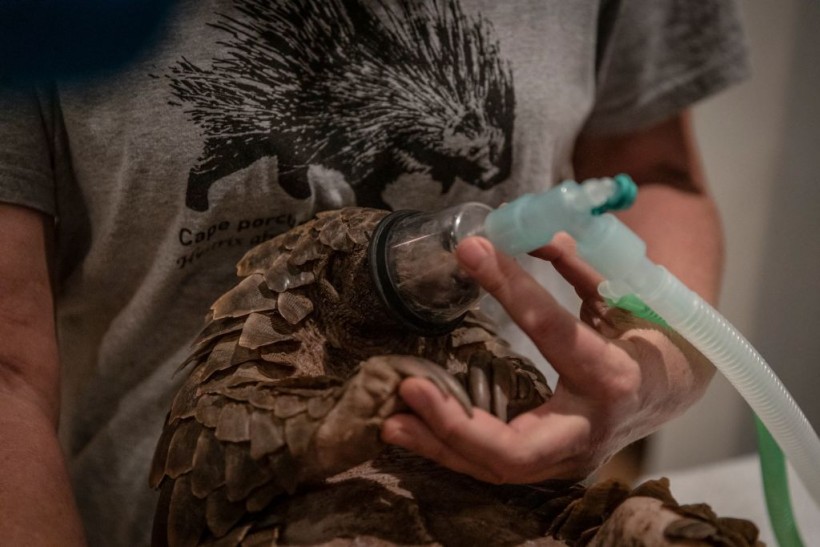A trafficked pangolin was recently rescued from a province in South Africa. The patient, named Lumbi, is now safe at the hands of the conservation authorities. Veterinary experts now take care of it at an animal hospital.
Lumbi and Pangolin Friends Healing from Poaching Damages

Wildlife Rehabilitation Specialist Nicci Wright fed oral medication to trafficked rescued pangolin at a special ward in a highly secured offsite undisclosed location on November 23, 2021. - Pangolins are believed to be the most trafficked mammals. They're prized for their scales, made of keratin, like human nails used in Asia for their supposed medicinal properties. Only found in the wild in Asia and Africa, their numbers are plummeting under pressure from poaching. Wildlife watchdogs list pangolins as vulnerable to critically endangered species.
Lumbi is now in the process of recovery. Most of its feed is given through a syringe and includes nutrients and proteins in the form of smoothies. Medicines and monitoring of vital health are strictly followed for Lumbi to regain its strength.
Lumbi's post-rescue medical operations are focused on treatments against a blood parasite that the animal caught during the trafficking activities. The pangolin was recovered from illegal poachers in Limpopo, a northern region in South Africa, by the local police.
Lumbi and other pangolins are now being treated for their wounds and trauma at the Johannesburg Wildlife Veterinary Hospital. The institute was founded in 2016 and, since then, has given unparalleled rehabilitation and medical services to admitted animals, particularly those facing the population of indigenous wildfires.
The authorities brought the pangolin and its friends from poaching criminals in South Africa. Some of the pangolins originated from Mozambique, Namibian, and Zimbabwe.
Upon rescue, it was found that some of the pangolin victims were in terrible shape. Specialists immediately relayed medical care to the patients to save them from further health risks. PhysOrg reports that the pangolins were hidden in vehicles and even sacks without food and drink for weeks.
Wildlife rehabilitation expert Nicci Wright explained that their situation in facilities seemingly became an intensive care unit for the rescued pangolins. Wright is among the team that directly handles operations for Lumbi.
The pangolins will be kept in a secret site before their release. The place will be utilized for further treatments and exercises from weeks to months. If the animals reach their healthy state, they will be released back into the wild.
Endangered Pangolins: Mysterious Mammals
The pangolins have already existed on our planet for about 80 million years now. However, the medical field knows only limited information about the species.
Wright said the pangolins are unique compared to other animals. The expert had been working on medical services for pangolins since 2008. Throughout the studies on these animals, some treatments had been tested by the veterinary experts to provide the right and convenient care for pangolins.
The veterinary community does not deny limited data regarding the rehabilitation and medicine procedures dedicated to pangolins. Most specialists administer the standard treatments intended for cats and dogs, which often works.
Pangolins are endangered species that belong to the most trafficked mammals around the globe. Syndicates take an interest in scales that are composed of keratin. These compounds, also present in the human nails, are frequently utilized for medicinal substances in Asia.
Up to this date, the total number of existing pangolins is unknown.
RELATED ARTICLE: Critically Endangered Hammerhead Shark Spotted Further South of Australia Where They Are Rarely Seen
Check out more news and information on Endangered Animals in Science Times.














